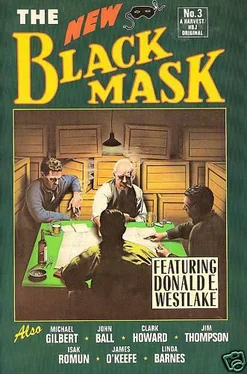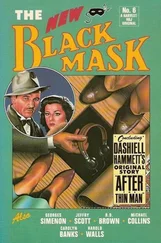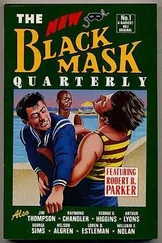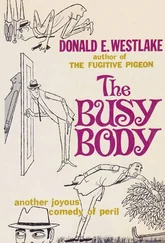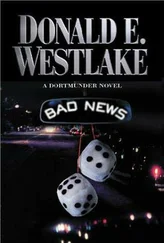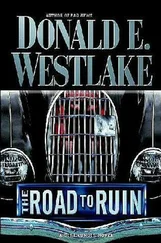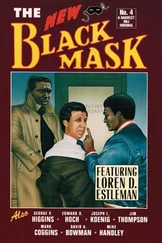Donald Westlake - The New Black Mask ( No 3 )
Здесь есть возможность читать онлайн «Donald Westlake - The New Black Mask ( No 3 )» весь текст электронной книги совершенно бесплатно (целиком полную версию без сокращений). В некоторых случаях можно слушать аудио, скачать через торрент в формате fb2 и присутствует краткое содержание. Год выпуска: 1985, ISBN: 1985, Издательство: A Harvest/HBJ Book Harcourt Brace Jovanovich, Жанр: Детектив, на английском языке. Описание произведения, (предисловие) а так же отзывы посетителей доступны на портале библиотеки ЛибКат.
- Название:The New Black Mask ( No 3 )
- Автор:
- Издательство:A Harvest/HBJ Book Harcourt Brace Jovanovich
- Жанр:
- Год:1985
- ISBN:978-0-15-665481-4
- Рейтинг книги:5 / 5. Голосов: 1
-
Избранное:Добавить в избранное
- Отзывы:
-
Ваша оценка:
- 100
- 1
- 2
- 3
- 4
- 5
The New Black Mask ( No 3 ): краткое содержание, описание и аннотация
Предлагаем к чтению аннотацию, описание, краткое содержание или предисловие (зависит от того, что написал сам автор книги «The New Black Mask ( No 3 )»). Если вы не нашли необходимую информацию о книге — напишите в комментариях, мы постараемся отыскать её.
The New Black Mask ( No 3 ) — читать онлайн бесплатно полную книгу (весь текст) целиком
Ниже представлен текст книги, разбитый по страницам. Система сохранения места последней прочитанной страницы, позволяет с удобством читать онлайн бесплатно книгу «The New Black Mask ( No 3 )», без необходимости каждый раз заново искать на чём Вы остановились. Поставьте закладку, и сможете в любой момент перейти на страницу, на которой закончили чтение.
Интервал:
Закладка:
It never would have happened at all if Maggie MacDonald had been at her desk as usual. Through four administrations Maggie had presided over the governor’s appointments, and no one could recall that she had ever made a mistake. Because of her unerring ability to keep everything sorted out in proper order, and the acute sixth sense that she sometimes displayed in knowing who should get in and who should be kept away, no one had brought up the matter of her age. There was no one her equal to replace her and if perchance she were technically over the age limit for her job, no one was going to be rude enough to even think about it.
But Maggie had an appointment for her annual physical examination and the person who had been designated to fill in for her was unaccountably late. Which is why Mrs. Willis M. Roberts and Mrs. Chester R. Burke were shown into the same waiting room when every effort should have been made to be sure that they never met. By the time the replacement for Maggie was at her desk the damage had been done. She realized it at once, but there was nothing she could do about it except pray that the two women did not fall into conversation. If that happened…
Meanwhile, the governor’s clemency secretary was standing beside the desk of the state’s chief executive. He was a thoroughly conscientious man, perhaps the single best appointment that the governor had made. He gave his recommendations very carefully and never without a full consideration of the evidence available. If a further investigation was indicated, he was tireless in seeing that it was done properly. He was also a very tough man to lobby. He had the full respect of his associates, the press, and the members of the bar.
As he spoke the governor listened carefully and silently. It was the most important case to come up since the election, and it involved the newly reinstated death penalty. If the execution did go forward as scheduled, it would be the first one under the new law. There was a great deal of public emotion on both sides of the question, but the voters had been decisive in the referendum that restored capital punishment. That was a mandate, and the governor knew it, but it was not going to be allowed to decide the issue.
“I want to know something,” the governor said. “Is there the least possibility that Roberts might be innocent? Could he have been framed? I know such things are done. Could he simply have been in the wrong place at the wrong time?”
The clemency secretary shook his head. “Governor, I can give you my assurance there is no possibility of innocence. After the trial and sentencing, Roberts admitted that he was guilty. That fact was not publicized, but I checked it out and it’s true. Also, he supplied some additional details that the sheriff himself didn’t know.”
“That’s bad,” the governor said.
The clemency secretary nodded, regretfully. “It is,” he agreed. “And now you want my recommendation.”
The governor took a breath and held it for a moment, knowing that a man’s life was at stake.
The clemency secretary spoke calmly and quietly. “I am recommending that clemency be denied. In my own conscience I don’t believe in capital punishment, but it is part of the law and if anyone has ever deserved it, Roberts is the man. I can’t find a single mitigating condition: He wasn’t drunk, under the influence of any drug, or otherwise incapacitated. He killed the little girl in cold blood, knowing what he was doing and the penalty for his crime. He has a long history of violent offenses, many of them sexual in nature. Like Chessman, one of his victims is in a mental hospital, probably permanently. Another, a girl of sixteen, can never have children.”
The governor sat a little straighter. “We aren’t passing judgment here on these offenses. Or the fact that he was on parole at the time he committed the murder. I have to decide this solely on the grounds of the crime for which he was sentenced — to die.”
The clemency secretary fingered a folder that he held, but which he had not opened. “I certainly agree with that,” he said. “I beg your pardon — I should not have brought up the matter of his record. Please ignore it if you can.”
The governor relaxed visibly, reached for a cigarette, and then pushed the pack away. “How about life imprisonment, without possibility of parole? Then he would have to look forward to the rest of his natural life behind bars. Taking away all hope is pretty severe punishment.”
The clemency secretary allowed a moment to pass before he responded to that. When he did, he was quite factual. “I considered that alternative very carefully, Governor, before I made my recommendation. We may say ‘without possibility of parole’ now, but ten or fifteen years hence, under a different administration, he might very well be let go. It has happened, you know.”
For almost a full minute it was stone quiet in the big office. Then the governor asked one more question. “Is there anything else that you haven’t told me — anything you think I should know?”
Again the clemency secretary fingered the folder. “Yes,” he answered. “I have some photographs here. They’re pretty awful. They show something that has been kept completely under cover. One reporter knows it, but he has given his word to keep it to himself. Frankly, they are largely responsible for my recommendation.”
The governor was not one to duck a responsibility, even an extremely unpleasant one. “Let me see the pictures.”
Reluctantly, the clemency secretary handed them over.
The governor looked at them carefully. It was a grisly job, one that brought home for the first time the magnitude of the crime.
“Was the victim tortured?” the governor asked.
“Yes.”
“Badly?”
“Very badly.”
“And she had done nothing to this man to incite him to this kind of horror?”
“Nothing whatever. She was completely innocent. She hadn’t even been taught the basics of human sexuality, only to guard and protect herself.”
“So there’s nothing there.”
“I’m afraid not.”
The governor looked again at the pictures, because the decision to be made was so important. The clemency secretary waited. He had spoken his piece, and he knew enough to remain silent.
“Part of one leg is missing,” the governor noted.
“That’s — the vital point.”
His tone, cautious and careful, was nevertheless decisive. The governor looked up. “Can that mean what I’m thinking?”
The clemency secretary nodded. “Yes, it does. He confessed to that too.”
“Did he say anything — anything at all — to indicate remorse?”
He hated to do it, but the clemency secretary delivered the knockout blow. It was his duty and he would not shun it. “He said she was delicious.”
Ten seconds ticked away. “Clemency refused,” the governor said. “Now show his mother in. I’ll tell her myself.”
The girl sitting in Maggie’s chair could not help it; she had to go to the bathroom. She rose silently from her place and went out quickly with the air of someone who would be back momentarily. When the door had closed behind her the two women who had been waiting were left alone, looking at each other. It was Mrs. Roberts who spoke first. “Are you here about… the Roberts case?” she asked.
Mrs. Burke nodded, quietly and firmly. “Yes, I am. I’m waiting to see the governor.” This was self-evident, but it gave her something to say and she was in need of it.
“Are you a social worker?”
“No, I’m not.” Realizing that that was a trifle brusque, she added, “I work in a computer plant.”
“But you are here about clemency.”
Mrs. Burke’s eyes were suddenly wet. “Yes. I didn’t want to come, but now I know that I must.”
Читать дальшеИнтервал:
Закладка:
Похожие книги на «The New Black Mask ( No 3 )»
Представляем Вашему вниманию похожие книги на «The New Black Mask ( No 3 )» списком для выбора. Мы отобрали схожую по названию и смыслу литературу в надежде предоставить читателям больше вариантов отыскать новые, интересные, ещё непрочитанные произведения.
Обсуждение, отзывы о книге «The New Black Mask ( No 3 )» и просто собственные мнения читателей. Оставьте ваши комментарии, напишите, что Вы думаете о произведении, его смысле или главных героях. Укажите что конкретно понравилось, а что нет, и почему Вы так считаете.
